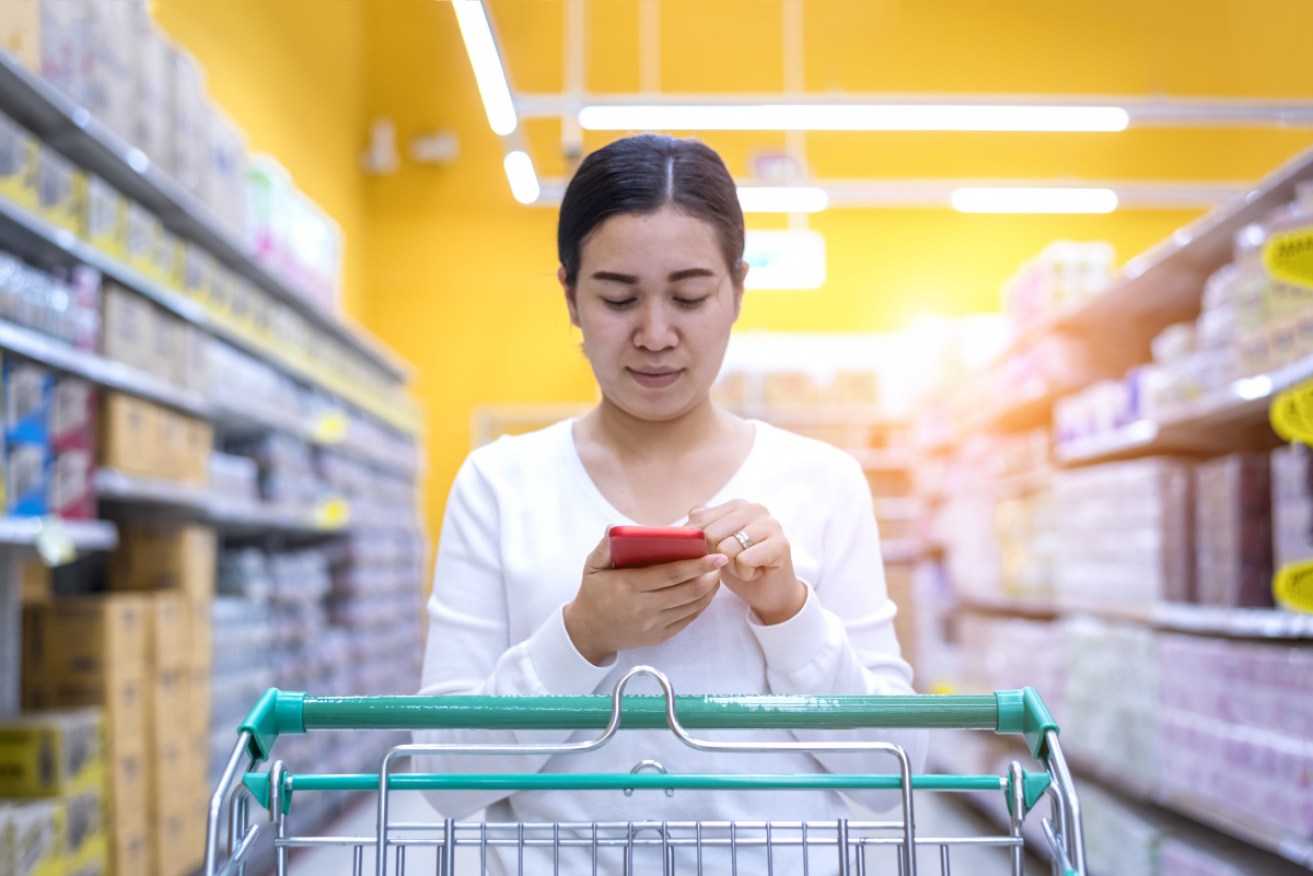The tech trends that will change supermarkets as we know them


Our phones will play more and more of a role in how we do our weekly grocery shop. Photo: Getty
Supermarkets will be unrecognisable in five years, with checkouts tipped to fade out, and interactive smartphone apps to be introduced as a routine feature.
Technology is rapidly being introduced to business models to create a quicker, more personalised experience for the Australian shopper.
Some of the tech can already be spotted in trial rollouts across the country, but it’s just the start of what’s to come.
Much of it is becoming commonplace in the US, and it’s likely to filter Down Under quickly.
In the United Kingdom, developers are going further, using augmented reality to steer a shopper’s experience, suggesting recipes and leading them to related ingredients.
Tweet from @AndrewProjDent
Food retailing expert Gary Mortimer said supermarkets were scrambling to constantly refresh and rejig the shopping experience to retain and attract customers.
“The challenge that the big supermarkets face is the constant requirement to be new and different,” said Associate Professor Mortimer, of the Queensland University of Technology.
“They’re trying to transform a boring, mundane daily task in grocery shopping.”
Professor Mortimer told The New Daily there were six key trends we could expect to see in our supermarkets within five years – plus some that are already in place.
Speed
Coles and Woolworths have already started to up their grocery delivery game by teaming up with third parties, and Professor Mortimer says we can expect strategic alliances like these to become the norm.
Woolworths in April announced it had partnered with on-demand service Yello to offer two-hour deliveries in select areas, while Coles has Uber Eats in its corner.
“When you buy a T-shirt or clothing online you expect to receive it in a few days,” Professor Mortimer said.
“But when you buy groceries you really want it delivered on the same day, or within a few hours.”
Cash or card? Neither
Trials of checkout-less supermarkets are already under way in Australia.
In the US, it’s predicted checkouts will disappear completely within 10 years. A research paper has tipped the physical space created by the wipeout will be replaced by grocery pick-up facilities.
While some players in Australia are trialling scan-and-pay services through mobile phones, technology is already at work in the US that uses shelf sensors and cameras to track customers’ movements.

Convenience chain 7-Eleven opened its first cashless, cardless store in Melbourne in May. Photo: 7-Eleven
Last year, Woolworths rolled out a cashless, cardless system at Double Bay. While there’s still cashier-manned and self-serve registers, through an app and the supermarket’s loyalty program, shoppers can scan their items and have the payment automatically deducted from their bank account.
Convenience giant 7-Eleven has also entered the game, opening a store in Richmond in May that is completely checkout free.
Back to the future
So what will supermarkets do with all the staff that used to man checkouts, or solve self-serve woes?
They’ll be redistributed as product specialists, Professor Mortimer said.
“It’ll be a return to that theatre of retail … A hark back to the ’50s and ’60s,” he said.
“You’re talking to the butcher about the cuts of meat, the baker is there pulling bread fresh out of the oven.”
New supermarket stores will also get smaller – companies will target inner-urban areas where populations are booming, but because the land is too expensive to build full-service outlets on, expect to see smaller, more tailored layouts.

Do you remember when supermarkets had butchers and bakers on hand? Photo: Getty
No more sales
Professor Mortimer said supermarkets will slowly phase out sales, in favour of cultivating a price trust system with shoppers.
“One of the gripes that consumers have, is they go to the supermarket, and this week their favourite cereal is $3.50. They go back the next week and it’s $7. The next week it’s $4,” he told The New Daily.
Instead of spending millions annually on promoting their specials, he said supermarkets will reinvest those advertising dollars into dropping prices across the board.
So goodbye to junk mail?
Catalogues will still exist, Professor Mortimer said, they’ll just be different.
Using data from loyalty programs – and purchase history gathered from phone-scan checkouts – supermarkets will tailor their e-distributed catalogues to individual shoppers.
Just for you
Personalisation will be an overarching theme in supermarket developments, paired with advents in artificial intelligence and augmented reality.
Again, customers’ smartphones will be at the heart of the development, allowing supermarkets to track and target shoppers to tempt them with specials.
Beacon technology has been around for some years, and is linked to smartphone apps, pushing out notifications and messages when a user comes near a beacon “sensor”.
“(The sensors will be) embedded in lights, so you’ll be walking down the pet food aisle – and Coles or Woolworths know that your favourite product is Dine – and as you’re standing there, you’re getting a push notification (on your phone) with an offer right for you for Dine,” Professor Mortimer said.
Augmented reality might take a little bit more time to arrive, but when it does, it will look like this: “You look down the phone’s camera at the grocery aisle and offers will pop up – your favourite cereal pops up with an offer just for you.”

It’s not just supermarkets that are delving into the world of augmented reality – it’s expected to sweep all corners of retail. Photo: Getty
A lot of these advancements rely on customers happily handing over their data through loyalty programs and phones. But if they get something back in return – like a discount or special offer – they’ll play along, Professor Mortimer said.








